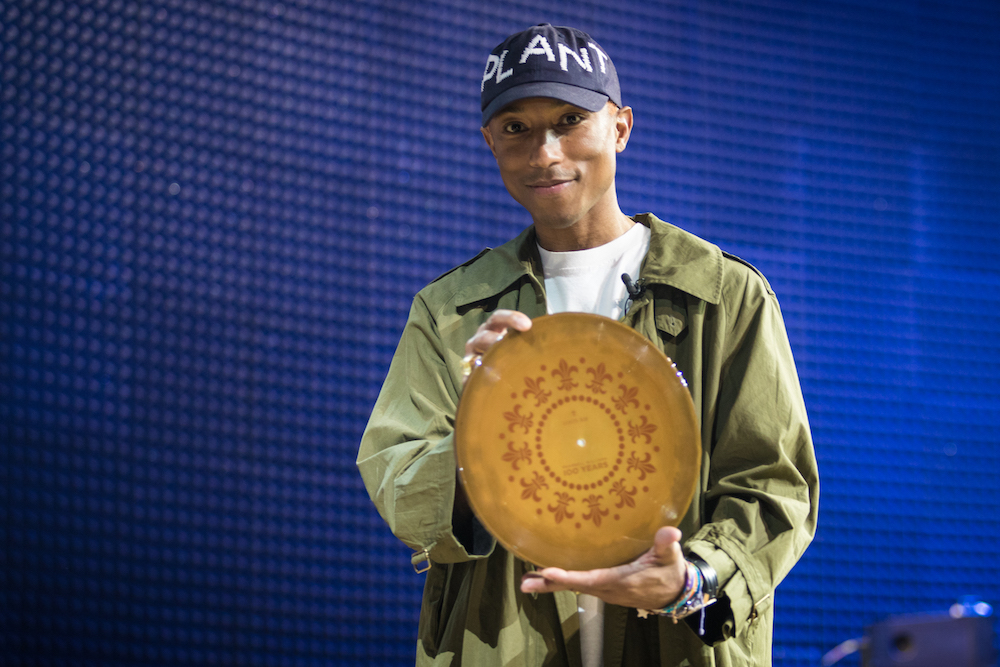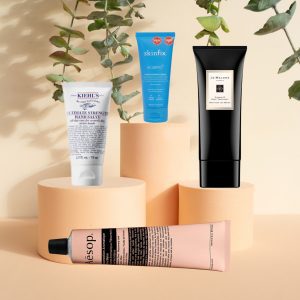Louis XIII cognac and Pharrell are showing big businesses that corporate social responsibility and luxury can work together to bolster a brand’s identity — and its bottom line.
It’s a long journey from Toronto to Shanghai, but we’ve arrived in the showpiece of booming mainland China in one piece. Luxury cognac maker Louis XIII has invited us here, their most rapidly expanding market, for the debut of 100 Years. All we’ve so far been told by the brand is that 100 Years epitomizes a partnership; an affiliation they deem the outcome of a mutual dedication to the environment, as well as an appreciation for its fragility.
A self-styled ambassador of French art de vivre, Ludovic du Plessis, Louis XIII’s Global Executive Director, abruptly takes centre stage of a palatial Ritz-Carlton conference room. Without hesitation, he reveals that celebrated singer-songwriter Pharrell Williams has recorded a first-of-its-kind musical composition for the brand. It’s been engraved on a unique clay record made from the rich soil of the Cognac region in France, where Louis XIII has been historically produced since 1724. And once Pharrell premieres this song later tonight — for a select audience, of which we will be a part — it’ll be kept in one of Louis XIII’s cellars in a custom, state-of-the-art safe. The safe has no code and no key, as it will unlock automatically a century from now in November 2117. But it is also water-soluble, meaning the world’s only copy of the track will be destroyed if our neglect for the earth leads water levels to rise up.
In other words, future generations will only be able to hear it if we care.
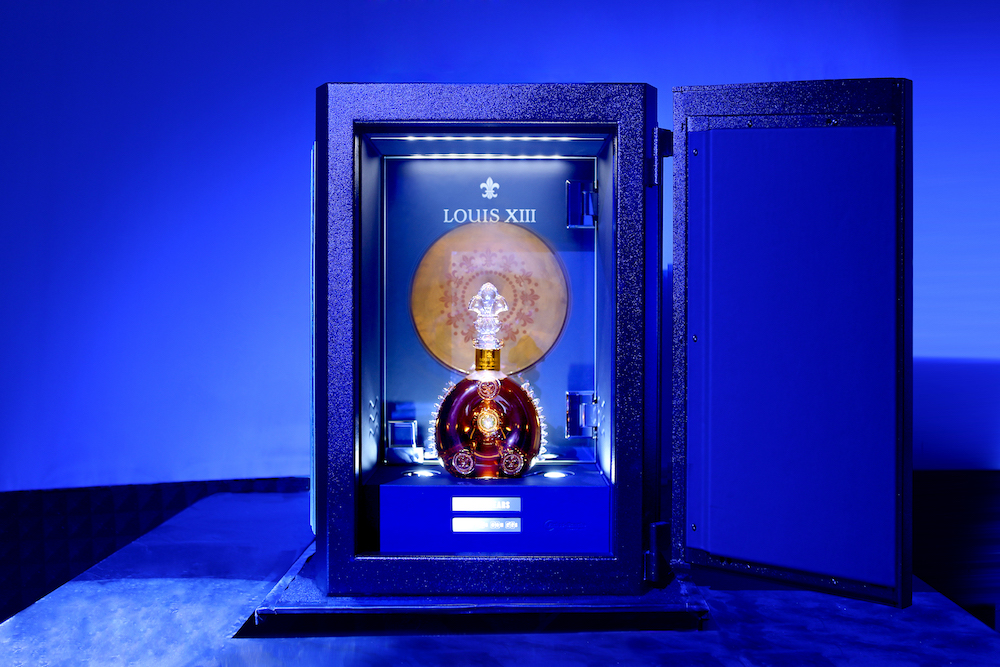

Avant-garde as the campaign initially comes off, truth is, it starts to click almost instantly. Despite being too often perceived as restrictively consumer and identity-oriented, more and more luxury brands like Louis XIII are applying their sweeping influence to tackle social responsibilities head on. Especially as it relates to our natural world, where innovative measures in the same spirit of 100 Years have begun translating purpose and accountability into concrete action.
Back in 2010, Hermès introduced their Petit h Project. Conceived as a strategy to alleviate the amount of waste the French fashion house produces, Petit h salvages discarded materials from its workshops, then upcycles them into brand new, one-of-a-kind objects for retail. Sustainability has rarely been an issue many luxury goods manufacturers confront directly. Most opt to destroy their defected or surplus merchandise. Yet by utilizing scrap bits and pieces of leather, silk, porcelain and crystal, the brand claims their craftspeople now create upwards of 160 novel pieces in a single twelve-month period.
One year later, Four Seasons Hotels and Resorts announced a global commitment to plant ten million trees to mark its fiftieth birthday. As part of a long-term effort to support sustainability, 10 Million Trees formed the cornerstone of Living Values – the Canadian luxury hospitality chain’s existing social responsibility plan. As a means of fulfilling this promise, subsequent deeds undertaken by the Living Values initiative have included a range of commitments, from working with community farmers in Hawaii and saving elephants in Thailand to reviving coral reefs in the Maldives and supporting the sea turtle population around the West Indies. The symbolism was not to be lost. From its inception in 1961, the Four Seasons logo has depicted the annual cycle of a tree. More importantly, trees play a critical role in a healthy ecosystem and a healthy planet.
Were the bold steps undertaken by these luxury brands effective? Well, besides breathing new life into unwanted bits, Petit h has tested the limits of Hermès in terms of shapes, material, colours, and techniques. For their part, Four Seasons says Living Values engages over 35,000 employees in more than thirty countries to help meet the company’s goals in local farming, wildlife conservation, recycling, waste management, energy conservation and the like
If you were to quantify success based on these grounds, then yes, the aforementioned luxury outfits have demonstrably achieved favourable results. That said, precisely determining what financial gain – if any – these environmental endeavours have yielded remains largely speculative. But perhaps that’s not the point. Instead, maybe what the results really suggest is that for luxury brands to make their bottom line, and still be socially conscious, the two pursuits need not be considered mutually exclusive.
These days, both look achievable.
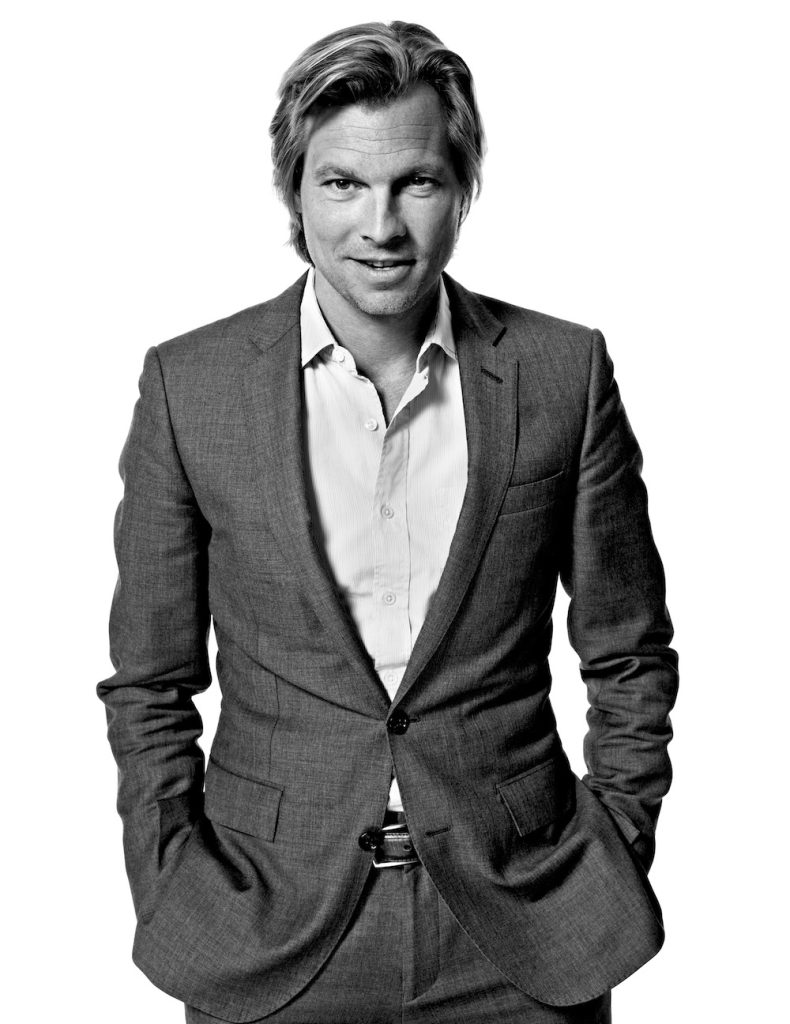

With this realization no doubt top of mind as he addresses the turnout assembled at the 100 Years press conference, Ludovic du Plessis ardently describes the brand’s venture with Pharrell as a powerful exploration into the way our behaviour today shapes the world of tomorrow. A campaign that will inspire us to take action and motivate others to get involved in curing global warming.
But to collaborate on 100 Years, specifically, and help get Louis XIII’s message across, du Plessis confesses they needed to bring a visionary artist onboard. Someone who not only understands what the brand stands for, but genuinely cares about the cause.
He welcomes Pharrell to the dais to rapturous applause. Part multi-platinum recording superstar and part environmental activist, Pharrell’s a worthy ally for 100 Years. In recent years, he has teamed up with Al Gore for a series of Live Earth concerts to promote environmental performance, joined forces with Parley for the Oceans to put an end to the endless consumption of plastic, and partnered with the United Nations Foundation on the International Day of Happiness to call for more being done on climate change. And that’s just the tipping point.
“I know that as human beings, we get so used to the minutiae of everyday stuff we have to do,” Pharrell acknowledges. “You have to go to work, you have to look after your family, you have plans. You forget that you live on the third rock from the sun.”
The greenhouse gas dilemma is very real to Pharrell, and he doesn’t think we’re doing what we should as a species who appreciates their habitation. “We have one home right now. So when this opportunity was presented, I was like, ‘Man, this makes sense.’”
Pharrell has never shied from taking a proactive stance when it comes to fighting for the environment, frequently putting his money where his mouth is. In 2014, he originated G-Star Raw for the Oceans, a collaborative fashion collection made in part from recycled materials. Then, in 2015, he launched a gaming app encouraging the world’s youth to tackle ocean pollution.
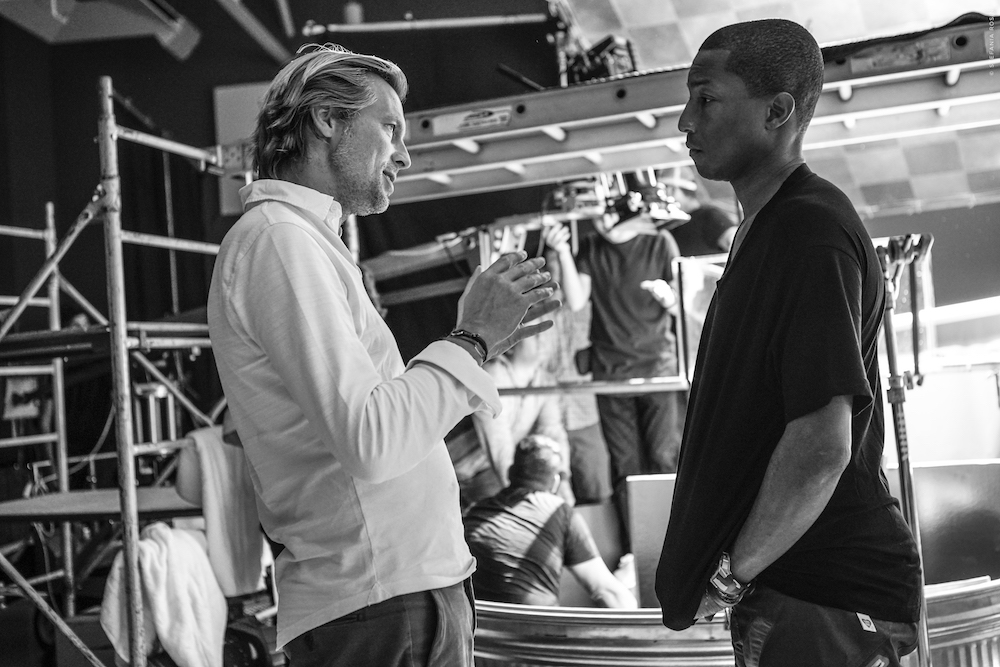

To be certain, 100 Years isn’t merely about positioning Pharrell’s celebrity status to engender environmental awareness for the sheer sake of it. No, climate change is a crisis that hits Louis XIII close to home.
Eric Vallat was appointed CEO of the House of Rémy Martin in 2014. A polished, urbane sort who seeks to reach beyond the product for a true brand experience, Vallat assumes overall leadership for the French firm, including Louis XIII. 100 Years was his brainchild. And with respect to the upmarket goods sector that the opulent cognac brand occupies, he’s no stranger. Vallat was formerly a top executive at none other than LVMH.
“What I like in luxury is that, above all, there is passion,” Vallat explains in a one-on-one dialogue just hours before the 100 Years premiere. “There is the passion for craftsmanship; for a certain know-how. There is the passion for product and for every single detail in what you do, even in retail. But luxury must come together with a purpose.”
After joining Louis XIII, Vallat immediately recognized how important terroir was to the brand’s manufacturing process. The term is one French cognac producers employ to describe geological and climatic conditions that form the basis for their system of origin-controlled designation. “I also discovered how humbled we are in front of nature,” he admits. “There is a kind of humility in this field, probably more than in others, because it depends on nature… and you don’t master nature.”
That you don’t, as Vallat witnessed first-hand during Louis XIII’s 2015 harvest, which endured bewildering frozen rain throughout July. He recalls how the downpour rendered their Cognac vineyards to resemble something you’d expect to come across in the deep of winter, not midsummer. Sure enough, it impacted much of the yield. “Financially, we could survive. But then all of a sudden, you realize this has never happened before,” reveals Vallat. “Two years ago, we had hail. Last year, we had frost.” An operation as dependant on stable environmental conditions as Louis XIII cannot afford to wait and see what comes next.
Vallat doesn’t profess to be a scientist. For all he knows, maybe the next ten years “will be clean and fine.” Nevertheless, it raised his perception to the reality that human beings – and luxury brands like Louis XIII – have an impact on nature. “At least, we have to be aware of it now,” he concedes. Suffice to say, Vallat got the message (loud and clear) that regardless of what global warming might bring, the company has a responsibility to counter this phenomenon.
Louis XIII’s personal stake in climate change permeates the very foundation 100 Years is built on. “The world has changed so quickly. We have to make sure we preserve it.”
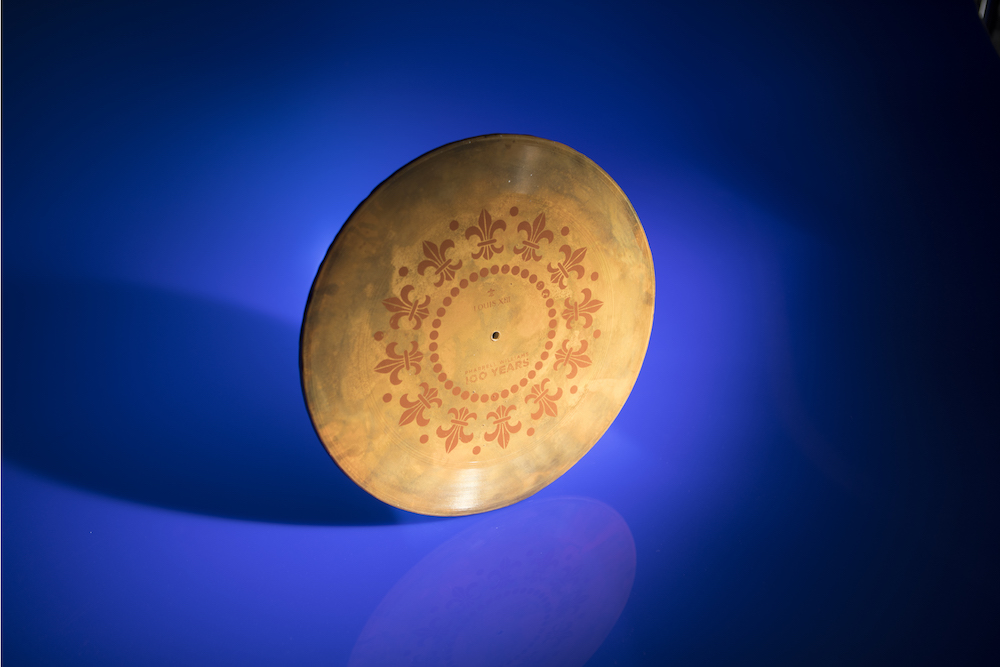

In gauging the benchmarks for what will make 100 Years a success, awareness is paramount. Moreover, in Vallat’s estimation, the quality of awareness about global warming that Louis XIII can generate. Needless to say, Pharrell’s soon-to-be heavily publicized involvement in 100 Years will surely play a definitive role in this.
This will naturally create heightened exposure for Louis XIII, although Vallat clarifies the campaign is not about being overly visible in the marketplace. “It is about being meaningful in everything we do. I don’t think people today want a brand to say, ‘Look, I am great!’ They don’t buy into it anymore. Classic advertising is over.” Indicative of his hands-on managerial style, he contends that today’s consumers want influential figures to talk about a brand instead. That they will trust what others say about it, and that they seek experiential value, to boot.
Finally, what’s arguably every bit as important to Vallat is that 100 Years serves Louis XIII in becoming more widely known for what they truly are: a heritage brand, with time and transmission beating at their heart. This far eclipses the need to just be known, period. “There is a real parallel between what we are doing with this song and what our Cellar Master is doing. We are telling our story in telling this story.” He’s convinced this parallel will be of bona fide interest to consumers, and that Louis XIII can leverage it – be it environmentally, promotionally or economically.
“It’s business with a purpose. A luxury brand is not only about a product anymore.”


And just like that, it’s over. Locked away for another century in a Fichet-Bauche vault. Never to be heard again by this generation – or the next several, for that matter. But that’s the idea. Pharrell didn’t record this song for us. It was intended for earth’s future population in 2117. To give them the opportunity to experience it, we need to take action against today. And should we be able to achieve the necessary course correction against climate change, then not only will their world be better for it, but Pharrell’s composition the bonus for a job well done. If nothing else, that’s probably the most important takeaway of 100 Years.
As the evening comes to a close, we’re told Louis XIII will embark on a global tour with the safe, making a number of stops in major international cities to create exposure – and raise funds – for environmental organizations. The brand will then donate the proceeds to agencies committed to fighting global warming on a local level.
“The idea is purpose,” Vallat reminds us one last time, reflecting the value he attaches to the socially conscious aspect in this business. “Luxury without purpose is not luxury.”


